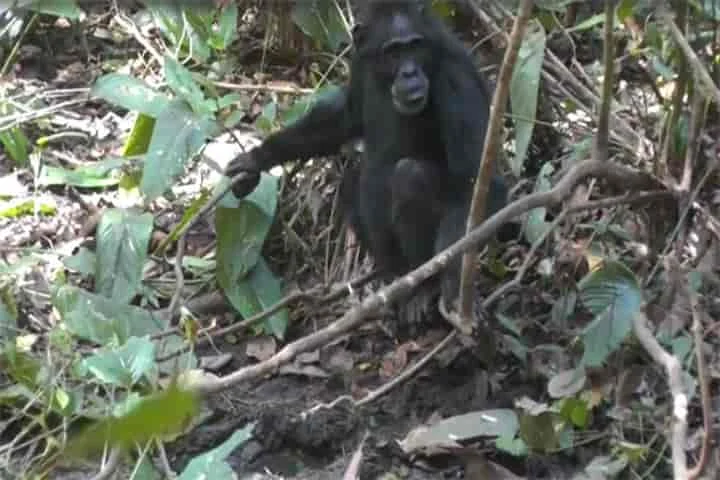

Scientists have come across a rare behaviour on the part of a group of chimpanzees in Uganda's rainforests who dig wells for drinking water (Pic. Courtesy sci-news.com)
<p>
<strong>Water is not only a precious and scarce resource but also an essential one without which nothing can survive on the planet. This life giver and saver can be accessed from rivers, springs, natural pools, etc and so digging on part of animals to access water is relatively a rare conduct as per a report in the sci-news.com and this has been recorded among a few species.</strong></p>
<p>
Now scientists belonging to the United Kingdom, Switzerland and Uganda have studied East African chimpanzees or Pan troglodytes schweinfurthii in Uganda&rsquo;s Waibira community and observed habitual well-digging in rainforest by them.</p>
<p>
<iframe allow="accelerometer; autoplay; clipboard-write; encrypted-media; gyroscope; picture-in-picture" allowfullscreen="" frameborder="0" height="315" src="https://www.youtube.com/embed/LCKbRmV_L_c" title="YouTube video player" width="560"></iframe></p>
<p>
The research which was published in the journal Primates was conducted and authored by Hella P&eacute;ter and colleagues suggests that this demeanour has been introduced in the community behaviour by an outsider, an immigrant female chimpanzee.</p>
<p>
Peter is a Ph.D. student in the School of Psychology and Neuroscience at the University of St Andrews and the School of Anthropology and Conservation at the University of Kent, UK.</p>
<p>
Outlining the study, Peter said: <a href="http://www.sci-news.com/biology/well-digging-chimpanzees-10947.html">&ldquo;Water, a resource of universal relevance,</a> is rarely considered a concealed resource; it is usually directly accessible from surfaces, cavities, or other types of containers. However, water is also present beneath the surface, where access is only possible through the creation of wells. Some species have been documented to regularly exploit concealed water. Reports include those on African elephants, warthogs and various equids, such as feral horses and donkeys, khulan, mountain zebras and plains zebra.&rdquo;</p>
<p>
This particular action of digging the well was first noticed in Onyofi &ndash; who had arrived in 2015 in the community as an immigrant. She had started this act instantly, thus pointing that she had learnt this art while living and growing up in a community which dug up wells.</p>
<p>
Following Onyofi&rsquo;s arrival, many other young Waibira chimpanzees as well as adult females were seen digging wells. Strangely, none of the adult males joined though they did use the wells excavated by others. Her skill drew a lot of admirers &ndash; young chimps and other adults — who observed her minutely. This indicates that this novel action was unfamiliar to the group.</p>
<p>
Onyofi&rsquo;s wells were favoured by other chimpanzees who drank from it directly.</p>
<p>
<strong>Water is vital</strong></p>
<p>
While the digging of wells is unusual, the action also highlights the importance of water as a resource among animals, including those dwelling in rainforests.</p>
<p>
With global warming and change in climate resulting in alteration in rainfall patterns, this type of behavioural adaptation may help and enable groups like Waibira to sustain and live even when their habitat changes.</p>
<p>
Commenting on this, Peter remarked: &ldquo;Well digging is usually done to access water in very dry habitats &mdash; in chimpanzees, we only know about three savannah living groups who do so. What we&rsquo;ve seen in Waibira is a bit different from those groups. First, they live in a rainforest, so most people assume getting water shouldn&rsquo;t be a challenge &mdash; but it looks like the yearly few months of dry season is enough to cause some trouble for them!&rdquo;</p>
<p>
Having said that, Peter also made another pertinent observation: &ldquo;What&rsquo;s also interesting is that the wells all appear next to open water, so the purpose of them is likely filtering, not reaching the water &mdash; the chimpanzees might get cleaner or differently flavoured water from a well, which is fascinating.&rdquo;</p>
<p>
The study also underlined a notable reaction of the part of the males in the group. Speaking on this aspect, Dr. Catherine Hobaiter, the study&rsquo;s senior author, stated: &ldquo;One of the most interesting things was seeing the other chimpanzees&rsquo; responses to Onyofi&rsquo;s digging &mdash; even large dominant males would politely wait for her to finish digging and drinking, and only then go and borrow her well, which is pretty unusual around such a valuable resource.&rdquo;</p>
<p>
Hobaiter who is a researcher in the School of Psychology and Neuroscience at the University of St Andrews and the Budongo Conservation Field Station added: &ldquo;We&rsquo;re curious to see what happens once some of the young males who can dig grow older &mdash; maybe they will be acceptable teachers for the big males, and they&rsquo;ll stop relying on others to dig wells for them.&rdquo;</p>
<p>
<strong>Also read: <a href="https://www.indianarrative.com/science-news/scientists-observe-how-chimpanzees-help-each-other-to-heal-injuries-148993.html">Scientists observe how Chimpanzees help each other to heal injuries</a></strong></p>
By Ajit Dubey The Indian Air Force is carrying out Exercise Aakraman (Attack) over a…
Several Indian American organisations have strongly condemned the recent terrorist attack in Jammu and Kashmir's…
Prime Minister Narendra Modi on Thursday spoke to the Prime Minister of Israel, Benjamin Netanyahu…
India's Sun Pharma and Israel's Moebius Medical published new data on MM-II, a non-opioid treatment…
Reliance Industries Chairman and Managing Director, Mukesh Ambani, joined the nation in mourning the deaths…
Chinese generative AI platform DeepSeek passed on personal details of Korean users to firms in…